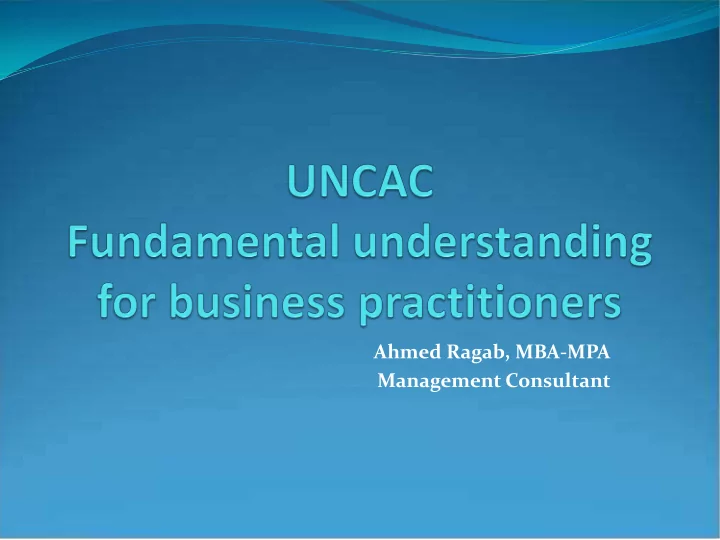

Ahmed Ragab, MBA-MPA Management Consultant
Where do we stand? TC Corruption Index - 2010 91 Gambia – Guatemala – Kiribati – Sri Lanka – Swaziland - Djibouti 98 Egypt – Mexico – Burkina Faso 101 Sao Tome and Principe – Tonga – Zambia – Dominican Republic
Background The purpose of the Convention is: to prevent corrupt practices and illicit fund transfer , and combat these practices effectively; to criminalize and repress corrupt practices; to promote, facilitate and support international cooperation and technical assistance; to return illegally transferred funds to their countries of origin ; and to promote integrity, accountability and proper management of public affairs and public property
Scope of the Convention The Convention acknowledges certain fundamental limitations in its approach and content: The recognition of State Sovereignty ; the inevitable and legitimate legal, cultural, social and political differences between States Parties; and their different levels of economic development
Role of business enterprises Art. 12 is devoted to anti-corruption measures in the private sector . It seems clear that achieving high moral and legal standards in relations with government is impossible unless companies also adopt high standards, for themselves and for their dealings with one another
Role of business enterprises The specific measures proposed in art. 12, 3 and 4 , include the promotion of internationally accepted accounting and auditing standards , the prohibition of off-the-books transactions, and the disallowance of the tax deductibility of expenses that constitute bribes
Role of the State States must endeavor to ensure that: Their public services are subject to safeguards that promote integrity, transparency and accountability among civil servants and hiring based on efficiency and merit (art. 7) Once hired, public officials must be subject to codes of conduct (art. 8), including measures such as declarations of assets, and disciplinary measures.
Role of the State States must also promote transparency and accountability in public procurement and management of public finances (art. 9), and must take measures to preserve integrity in especially critical areas such as the judiciary and prosecution services (art. 11), and to prevent money laundering (art. 14)
Asset Recovery In many cases, the money illicitly paid to public officials (or managers or employees of private organizations) is sent abroad, resulting in a drain of funds The Convention details the conditions, processes and means for those funds to be returned to their countries of origin
Asset Recovery Art. 57 distinguishes three different situations : 1) Embezzlement of public funds by a public official, who tries to conceal them in another country 2) Proceeds of corruption, that is, property that was not stolen (in fact, was given voluntarily to the corrupt public official), but was obtained illicitly and transferred to another country 3) All other cases of confiscation, where priority consideration is to be given to returning confiscated property to the requesting State Party or to its prior legitimate owners
Limitations It remains a limited instrument: It imposes no obligation on signatory countries to criminalize certain acts , such as passive bribery of a foreign public official, trading in influence, abuse of public functions It contains a number of provisions that each State Party “shall adopt”, others that each State Party “shall consider adopting” there is no obligation to make bribery and embezzlement in the private sector a criminal offence
A final thought The former regime was extremely hesitant in ratifying the convention UNCAC offers an opportunity to increase the trust of international investors and to enhance the credit rating of Egypt. Investors are attracted to trust and to sound business practices, not so much to the economic opportunity as ways and means to mitigate risk factors.
Thank you
Recommend
More recommend